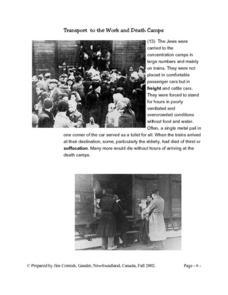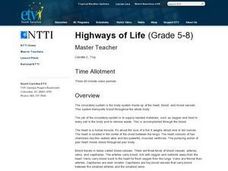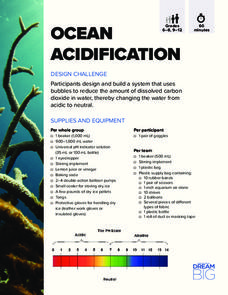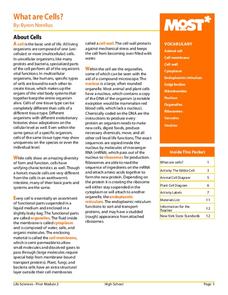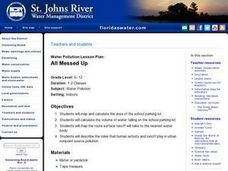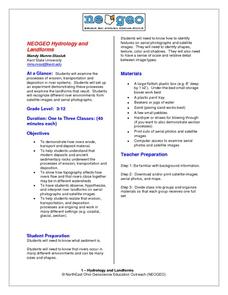Curated OER
Droplets and Downpours
Students explore how storm water flows through different habitats by sketching the slope of their yard, compare runoff for erosion, and create a sand castle. In this storm water lesson plan, students measure where their yard started and...
Curated OER
Transport To The Death Camps
In this social studies worksheet, students read the article about the concentration camps of WWII and focus upon the means of transportation to them.
Curated OER
Pooper Scooper
Science Students build a pooper scooper tool that helps them clean up after a dog without getting their hands dirty or their noses too close. They research the diseases that can be transported through animal waste and work in teams to...
Curated OER
Highways of Life
Students explore the circulatory system. They participate in media activities to explore blood flow and identify the parts of the circulatory sytem. Students create a model of the circulatory system.
Curated OER
Hydrologic Cycle
In this science worksheet, students read about the Hydrologic Cycle. Students use the reading and a diagram to answer 2 comprehension questions.
Curated OER
Early Filtrate Functioning
In this biology worksheet, students look at the function of filtering in the nephron of the kidneys and the biochemistry is emphasized.
Curated OER
Floodplains in the field (with GIS)
Students measure a topographic and geologic cross-section across a floodplain by simple surveying and auguring techniques. They consider the spatial context of the field observations, use GPS measurements, and desktop GIS analyses.
Curated OER
Agriculture Shapes Kentucky History
Young scholars explore the lives of early American Indians and settlers in Kentucky. They describe the agricultural practices of Indians native to Kentucky and develop a supply list for a group of settlers coming to the state to...
Curated OER
Coasts and Reefs: Shallow Marine Processes
A more thorough presentation on coastal systems would be difficult to find! Detailed diagrams illuminate the offshore, shoreface, foreshore, and backshore zones of beach. The sources and movement of sediments along the coastline are...
DiscoverE
Ocean Acidification
Combat ocean acidification with bubbles. Young engineers create a system that reduces the acidity of water. Dry ice in water helps simulate ocean acidity, and blowing bubbles into the water results in a gas exchange that neutralizes the...
Curated OER
What Are Cells?
Energize the cells of young biologists with an edible life science activity. Engaging students in exploring the inner workings of plant and animal cells, this activity involves using colored jello and various sweet and tasty treats to...
NOAA
Currents
A deep ocean current circles the globe at a force that is greater than 16 times all the world's rivers combined. Groups analyze the effects of submarine topography on deep ocean current speed. They then determine how this speed affects...
Curated OER
Physical Habitat of a Stream
Students measure in metric units and use a stopwatch, calculator. They collect data with minimal instructions after the initial pre-activity briefing, then record data in the data sheets provided.
Curated OER
All Messed Up
Pupils begin the experiment by mapping and calculating their school parking lot. They calculate the volume of water falling on the lot and map the route the water runoff takes. They discuss the roles that humans play in affecting water...
Curated OER
Biochemistry, Secretion, and Transport of Hormones
In this biology worksheet, students look at various steps involved in the biochemistry involved in the use of hormones on the human body.
Curated OER
The Romans: Public Health and Water
In this Ancient Rome worksheet, students read about the public health system of Ancient Rome: aqueducts, public baths and sewers.
Curated OER
Cellular Respiration and Photosynthesis
In this cellular respiration and photosynthesis worksheet, students read through the presented material and draw an illustration of the production of ATP. Students answer several short answer questions about the production of ATP,...
Curated OER
History of Hong Kong
Eighth graders explore the sites and attractions of Hong Kong. In this Geography lesson, 8th graders research the different forms of transportation and major landmarks. Students create a travel brochure for Hong Kong.
Curated OER
Do As the Romans: Construct an Aqueduct!
Learners explore how the Romans engineered and built aqueducts. They read a manual, explore the Construct a Roman Aqueduct online activity, and construct an aqueduct that will transport two liters of water across a short distance in the...
Curated OER
The Tennessee River: The Tie That Binds
Seventh graders examine the Tennessee River to see why it is still a major transportation artery in lieu of the age of modern transportation such as interstate highways, air cargo, and elaborate railway systems.
NorthEast Ohio Geoscience Education Outreach
Hydrology and Landforms
Three days of erosion exploration await your elementary geologists. Learners begin by examining rivers via Google Earth, then they model water flow in sand, and finally, they identify resulting landforms. This lesson is written...
Curated OER
The Silk Road, An Ancient Internet
Pupils examine how goods and ideas moved along an ancient trade route between China and Europe. They make charts of items, ideas, etc. that were transported along the Silk Route.
National Energy Education Development Project
Exploring Hybrid School Bus Technology
The color School Bus Yellow was created in 1939 because science had proven peripheral vision detects yellow 1.24 times faster than other colors. Young scientists explore modern school bus transportation options and then discuss the types...
Curated OER
Wheeling It In!
Students use everyday materials (milk cartons, water bottles, pencils, straws, candy) to build a small-scale transportation device that incorporates the wheel and axle and the lever. They race their carts/trucks, measure distance, time...



